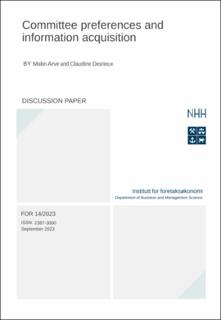| dc.description.abstract | We study committees whose task is to make a binary decision where the correct decision depends on the state of the world that is imperfectly known. Committee members can exert effort to learn about the true state of the world and their efforts are linked in a team production function. This allows to explore the externalities between the committee members’ efforts in the search for the truth and the different interactions between them. We compare committees made up of neutral members (neutral committees) to committees including biased members (polarized committees). We show that polarized committees may be more efficient than neutral committees when members’ efforts to acquire information are strategic substitutes, but not when efforts are strategic complements. Qualitatively, our results still hold when biased members have mixed preferences i.e., they have a bias for one decision outcome but also care about matching the decision to the true state of the world. Our results have implications for instance for the rules governing committees in international arbitration and allow us to better understand how the committee composition affects the committee’s efficiency. | en_US |
